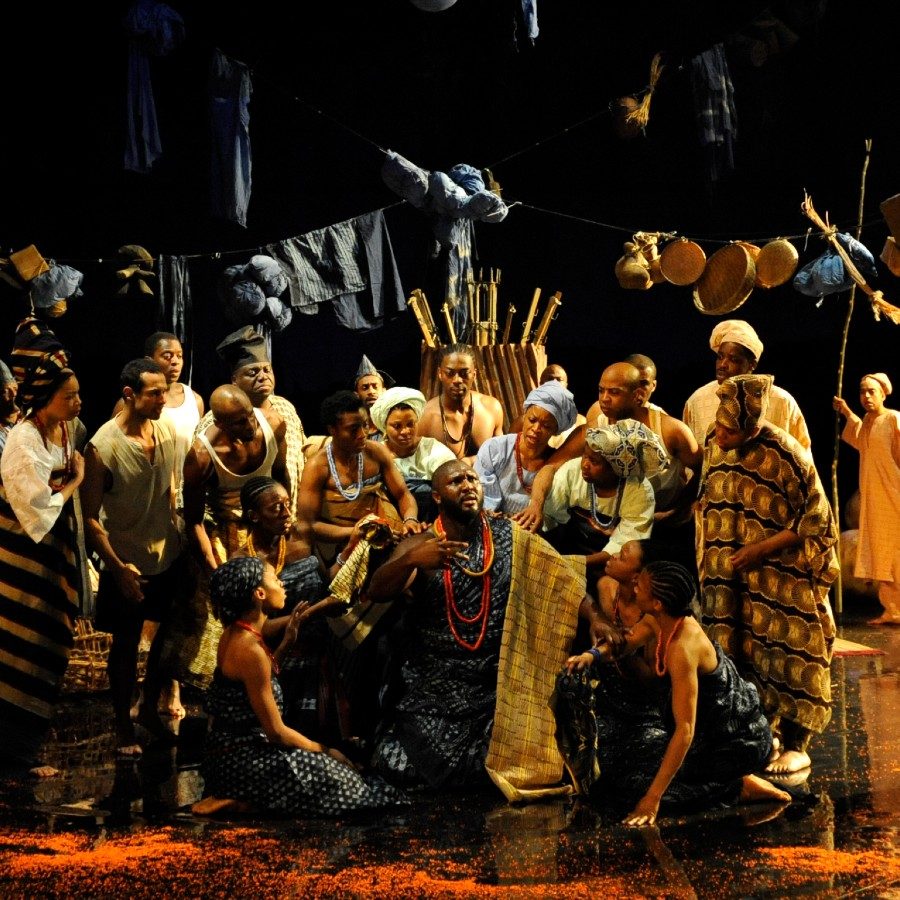
In July, the Nobel Prize-winning writer Wole Soyinka celebrated his 90th birthday. To honour his extraordinary career across novels, poetry, and drama, the National Theatre Archive would like to spotlight two of Soyinka’s plays, Death and the King’s Horseman and his adaptation of Euripides’ The Bacchae.
Wole Soyinka was born in Abeokuta, Nigeria, in 1934, and later went on to study and teach in Nigeria, the US and the UK. His work often speaks truth to power, using satire and lyricism to build on themes of corruption, colonialism and injustice.
Soyinka was previously imprisoned during the Biafran Civil War (1967-70) and later lived in exile during the 1993-1998 dictatorship of General Sani Abacha. He was awarded the Nobel Prize for Literature in 1986.
Death and the King’s Horseman (2009)
Soyinka’s play Death and the King’s Horseman was staged on the National Theatre’s Olivier Theatre in 2009, directed by Rufus Norris. The play charts differing views on fate within a Nigerian village, from the perspectives of indigenous Nigerians and their colonial oppressors.
When the village king dies, his horseman must end his own life to accompany the King in the afterlife, much to the horror of the colonial settlers. The play is based on true events, with the real-life equivalent occurring in 1946, in what is now the Nigerian state of Oyo.
Soyinka remarked that he hoped the play would encourage discussion beyond the so-called ‘clash of cultures’ on stage, saying to simply view through that lens alone was to ‘encourage analytical laziness’ (Guardian, 2009).
The play asks questions about tradition and liberty through a post-colonial framing, making audiences question both the British colonial settlers, as well as the decisions of the Nigerian villagers in the play.

Lucian Msamati as Simon Pilkings in Death of the King’s Horseman (2009). Photo © Robbie Jack.
The Bacchae (1973)

The poster for The Bacchae by Wole Soyinka, after Euripides (1973).
Soyinka’s earlier play, his adaptation of the The Bacchae (originally by Euripides), was staged in 1973. The play was performed at The Old Vic theatre, prior to the completion of the National Theatre’s ‘forever home’ on the South Bank and made Soyinka the first playwright of the Global Majority to have their work staged by the National Theatre, under the late Artistic Director, Peter Hall.
Soyinka’s adaptation of The Bacchae sets the play within the politics of post-colonial Nigeria, criticising what he called ‘guilty men of power’ who, like Dionysus in the play, often reframe themselves in a populist light to build a movement, before using that power to ultimately achieve their own aims.
The play follows Dionysus seeking revenge to clear his mother’s name, as the enslaved citizens oppressed by King Pentheus seek their freedom from tyranny. When Dionysus’ very presence in Thebes, and his wine and music, emboldens the citizens, they rise up in revolt against their oppression. Dionysus however, seeks only revenge against Pentheus.
Soyinka said of the play that he aimed to capture the ‘natural, historic process by which populist movements (religious or political) identify themselves with mythical heroes at critical moments of social upheaval’, just as Dionysus, a God, acts in the midst of Thebes’ enslaved rebellion.
Find out more
To learn more about these productions, visit the Black Plays Archive.
Death and the King’s Horseman also features in this Google Arts and Culture online exhibition, and our new In Search of Greek Drama episode focuses on The Bacchae.
About the author: Rianna Simons is the National Theatre Archive’s Black Plays Archive Coordinator.

Nonso Anozie as Elesin in Death of the King’s Horseman (2009). Photo © Robbie Jack.
Archive
The National Theatre Archive is open and free for visitors. Find out more about how to visit, take a tour and opportunities to get involved.
Image at the top: Nonso Anozie as Elesin, Giles Terera as Praise Singer in Death of the King’s Horseman (2009). Photo © Robbie Jack.